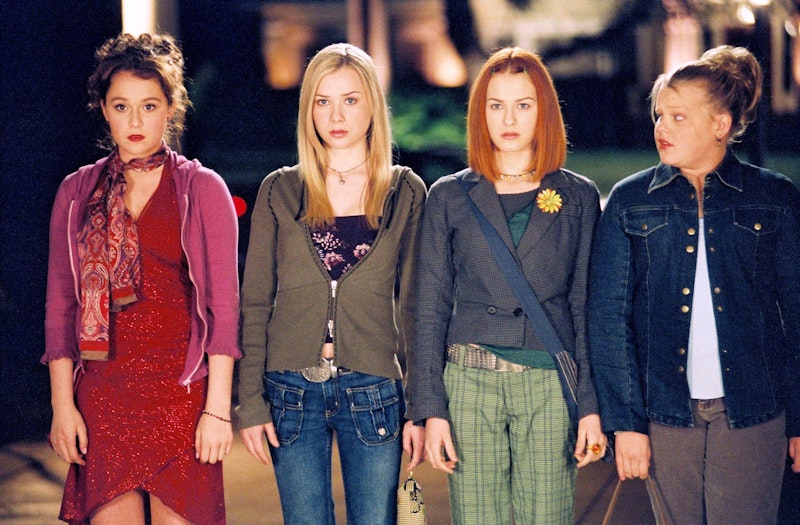One of the most pernicious aspects of popular cinema to this day is the casting of twentysomethings as high school students. Children can distinguish between movie violence and real violence, movie horror and real horror—I’m part of the second or third generation of kids that grew up playing video games, and a lot of them were first-person shooters, spy and crime thrillers like Syphon Filter and Max Payne, and crazy shit like Manhunt, State of Emergency, and Bully. By the time I checked out on video games, Call of Duty had reared its ugly head and began its eternal domination, a game I never liked or understood because it was so realistic and therefore boring, at least when it comes to guns; the Pentagon hit a home run with that one. Forget flight simulators: Call of Duty taught real kids about real war, real young.
None of this is good. But I haven’t changed my mind since 2000: Joe Lieberman was wrong. Violent video games and violent movies do not encourage violent behavior. A movie like Heat may inspire one band of criminals to mow through Los Angeles, and Magnum Force may have inspired the Hi-Fi Murders, but these are isolated incidents, not epidemics. Obesity is an epidemic; anorexia, bulimia, body dysmorphia are epidemics. And no one film, television show or video game is responsible. There isn’t a conveniently cursed object to blame, but an accumulation: people grow up thinking high school and college students look much older than they actually are.
The sex comedy has been with us since the early-1980s, inaugurated with Porky’s in 1982 and heavily inspired by Commedia sexy all’italiana, Italy’s own sex comedy craze of the 1970s and early-1980s. It’s a genre that hasn’t left popular American cinema since its ignoble introduction with horny boys spying on Kim Cattrall in the girls’ bathroom. John Hughes classed it up with his mid-1980s run, a batch of regressive, conservative, and square movies readymade for Reagan’s America. Molly Ringwald and Anthony Michael Hall were the only real teenagers in The Breakfast Club: Emilio Estevez, Ally Sheedy, and Judd Nelson were all born between 1959 and 1962, all in their 20s when the movie was shot in 1984. This was so common that it quickly became a joke, a staple of the genre as much as the “final girl” in horror.
Primetime soaps like Beverley Hills, 90210 and Euphoria must cast adults as teens because of their content, and this goes for most teen comedies and horror movies. It’s impossible to make something like American Pie or Cruel Intentions or Scream with a cast of child actors. All common sense, but this is just to say that American media lies to us about teenagers and high school every day. And this isn’t something cleared by dramatic license or suspension of disbelief; kids watch Superbad, Bring It On, Clueless, and John Hughes’ movies in their early-teens, if not before—more than anything else, popular cinema and television distort our expectations and image of high school and puberty in America. It only makes sense before you’re ever in high school: I found all teen comedies unwatchable when I was in high school, even a masterpiece like Heathers. Now, it’s just jarring seeing receding hairlines and people in their late-20s playing high school students.
There are no conclusions to draw from this. The “high school experience” is fetishized in America, and this kind of cinema allows people to indulge. Sleepover, directed by Joe Nussbaum, bombed in the summer of 2004, and I had never heard of it before my friend Roo recommended it. She, like many, had the DVD and watched it countless times—this was a major hit on home video, but I missed it. Starring Alexa PenaVega from Spy Kids, with a supporting part played by a nearly unrecognizable Brie Larson (her voice hadn’t dropped yet). This is the rare teen movie starring actual teens, and it’s jarring—it shouldn’t be. Sleepover doesn’t have a salacious plot or an honest coming of age story like 1985’s Seven Minutes in Heaven, which also stars young teenagers as young teenagers dealing with and talking about sex and puberty. It’s an uncomfortable movie—again, this shouldn’t be the case. The American obsession with high school is sick, made to work for marketing and the MPAA, when all of these stories could be set one year later at college, where people don’t have to play 15 at 31.
—Follow Nicky Smith on Twitter: @nickyotissmith

